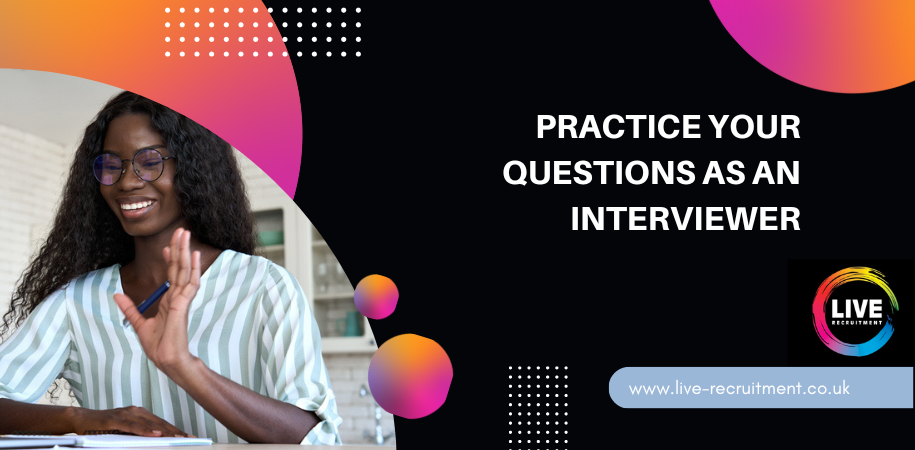Hiring managers are always looking for ways to improve their interviewing skills. One way to do this is to practice asking questions. By doing this, they can get feedback on their performance and see where they need to improve. There are a few different ways they can go about practising, and each has its own benefits.
You might think that asking questions is a simple enough task, but the way you ask the question can result in a drastically different answer. So learning to ask questions in the right way for the candidate in front of you is an important interview skill.
In this guide, we will explore some of the ways you can improve your interview technique by asking better questions.
The importance of asking better questions
When you’re interviewing someone, it’s important to get to the heart of their experience and skills. The questions you ask should be designed to uncover this information as effectively as possible. However, it can be difficult to know what kind of questions to ask.
If you’re not sure where to start, here are some question templates that will help you get the information you need:
What are your career aspirations?
Where do you see yourself in five years? Ten years?
What are your biggest achievements?
Why did you leave your last job?
What did you like/dislike about your current role?
What are you looking for in your next role?
These questions are standard interview questions, but each one could be phrased in a very different way. For example, the question “What is your greatest strength?” could also be asked as “What are you good at?” or “What do you excel at?”
Each question will elicit a slightly different response, so it’s important to choose the right question for the candidate in front of you. As you become more experienced, you will learn to identify the right way to ask questions to get the answers you are looking for.
Asking questions in different ways
One way to get better at asking questions is to practice asking them in different ways. This will help you to learn how to ask the same question in different ways, depending on the candidate’s responses.
For example, if a candidate says they have a weakness in time management, you could follow up with a question like, “Can you give me an example of a time when you struggled to meet a deadline?” Or you could ask, “how would you describe your management style?”.
This will help you to get more specific information from the candidate, and it will also show that you’re interested in their response. Remember that an interview should be like a conversation, so don't be afraid to use their answer to shape your next question.
Another way to ask questions is to use different types of questions. For example, you could ask a candidate “What would you do if…” or “Tell me about a time when…”
These types of questions are called hypothetical or situational questions, and they can be very useful in uncovering a candidate’s skills and experience. Candidates will be very familiar with this type of question and will be trained to answer using the STAR method. This stands for Situation, Task, Action, Result. This type of answer will tell you a lot about how a candidate has performed in the past.
Practising asking questions
If you're looking to improve your interviewing skills, one of the best things you can do is to practice asking questions. This way, you'll get a feel for what works and what doesn't, and you'll be able to get feedback on your performance.
One way to practice is to role-play with a friend or colleague. Take turns being the interviewer and the candidate, and try out different types of questions. You can also video yourself so that you can watch back and see how you come across.
Another way to practice is to use online resources such as practice interviews. These can be a great way to get comfortable with the format and flow of an interview, without the pressure of a real one.
And finally, you can ask to sit in on other interviews that aren't directly related to your sector. This can help you to observe how other people conduct interviews and learn from their techniques.
When you're practising, it's important to keep in mind the following tips:
Make sure your questions are clear and concise.
Ask questions that are relevant to the role you're interviewing for.
Avoid leading or closed questions.
Listen carefully to the answers and follow up with probing questions if necessary.
Take note of the non-verbal cues you're giving off, such as body language and facial expressions.
Be aware of any bias you may have so that you don't let it influence your questions.
Practising asking questions is a great way to improve your interviewing skills. By getting feedback and observing other people, you can learn what works well and make sure that you are asking questions that will get the best possible response.
Asking for feedback
As part of the interview process, it’s common to keep in touch with candidates to help give them feedback on their performance. It’s also becoming increasingly common for employers to ask candidates for their feedback on the interview process.
This is a highly effective way to improve your recruitment processes, but also to help individual interviewers to improve their style. You can also ask other members of the interview panel to provide feedback on your performance.
Actively seeking feedback is an essential part of growing as a professional, so don’t be afraid to ask for advice. However, you need to be prepared to receive feedback that you aren’t ready for. So, if you’re new to interviewing, always approach this stage with a thick skin and remember that you’re learning something new, and it doesn’t always come naturally to everyone.
Common mistakes interviewers make when asking questions
One of the most common mistakes interviewers make is asking leading or closed questions. These are questions that can be answered with a simple yes or no, or that suggest a particular answer. For example:
Have you ever worked in a customer-facing role?
Did you enjoy your previous job?
Leading and closed questions don't give the candidate the opportunity to expand on their answer or provide more information. This means that the interviewer doesn't get to learn anything new about the candidate. Instead, they should ask open-ended questions that encourage the candidate to share more about themselves. For example:
Tell me about a time when you had to deal with a difficult customer.
What did you like and dislike about your previous job?
What are your thoughts on customer service?
Asking open-ended questions is a great way to get to know the candidate and learn more about their skills and experience. However, it's important to avoid asking too many questions, as this can make the candidate feel interrogated. Instead, try to strike a balance between getting the information you need and making the candidate feel comfortable.
Finally, another common mistake that interviewers make is not listening carefully to the answers. It's important to really listen to what the candidate is saying and follow up with probing questions if necessary. This shows that you're interested in what they have to say and that you're taking the time to understand their answers.
Listening to more than just the words
Good interview technique means listening to more than just the words the candidate uses. You should also pay close attention to non-verbal cues. This is the body language and facial expressions that you give off when you're talking.
For example, if you're leaning forward, it shows that you're interested in what the candidate is saying. On the other hand, if you're crossing your arms or looking away, it can make the candidate feel like you're not interested in them.
Likewise, candidates will say a lot more than just their answers. If they make a face when they are asked about their previous employer, this could indicate that there is more to the story than they are letting on. Paying attention to these non-verbal cues can help you to get a better understanding of the candidate and their answers.
Key takeaway
If you want to improve your interviewing skills, it's important to practise asking questions. You should also actively seek feedback on your performance so that you know what you need to improve. This will help you to ask better questions and get more information from the candidate.
It's also important to listen carefully to the answers and follow up with probing questions if necessary. Finally, pay attention to the non-verbal cues you're giving off, as well as the ones the candidate is giving. This will help you to understand more about what they're saying and get a better idea of their true feelings.


